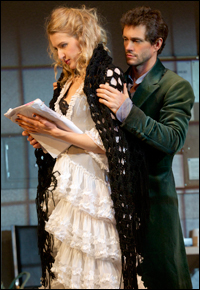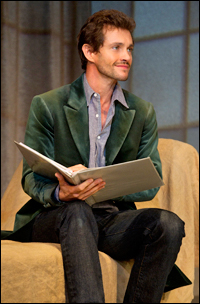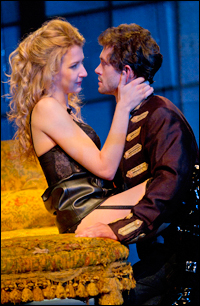
*
Hugh Dancy, the British actor who distinguished himself in Broadway's Journey's End and Off-Broadway's The Pride, is back on the New York City stage, starring in Venus in Fur at Manhattan Theatre Club's Broadway home at the Samuel J. Friedman Theatre.
In David Ives' darkly comic drama about sexual, social and professional power games, all in the setting of a rehearsal/audition studio, Dancy plays Thomas, a modern-day director who is casting his own adaptation of the S&M-spiced 19th-century novel "Venus in Fur" by Leopold von Sacher-Masoch (as in "masochism"). Like a hurricane, into the audition room bursts a leggy, quirky, caffeinated actress named Vanda, desperate to play the leading lady. Nina Arianda, who earned raves for the 2010 world premiere of Ives' play Off-Broadway, returns as the mysterious tempest in high heels, with Dancy joining her for the Broadway run. Tony Award winner Walter Bobbie (Chicago and Off-Broadway's recent The Submission) again directs what feels like a four-character play — Thomas and Vanda also perform his adaptation and assume roles from the novel as they dance around the possibility that Vanda might land the part. Dancy, who is also a regular on TV's "The Big C" and starred in the recent films "Adam" and "Martha Marcy May Marlene," spoke to Playbill.com the week of his Nov. 8 opening. The production, play and cast earned some of the best reviews of the new season.
| |
 |
|
| Dancy and Nina Arianda in Venus in Fur. | ||
| photo by Joan Marcus |
Hugh Dancy: Very simply. I went in and met with primarily Walter, David and Nina, and read with Nina. I think they'd been casting around for a while, and once I went in there, it was fairly immediate, really. Had you seen the production when it was Off-Broadway?
HD: I had not, and I had regretted that, and now I'm rather glad at the fact.
When you got the script, was it daunting to you that you'd be onstage for two hours without a break?
HD: No, that was the appeal! It's not two hours — it's like an hour and 45, maybe. No, that was definitely the large part of the appeal — just me and Nina onstage together without anywhere to hide, going through all the twists and turns of this play… Long before I really thought properly about the play itself, I knew that that would be a great exercise.
What was the rehearsal process like? Tell me a little bit about how Walter Bobbie works as a director.
HD: I'd say very straightforward. I mean, it's quite particular because it's only the two actors in this case, and [this team had] done the play before, so we all came with our own, I suppose, nerves. For me, it was about wanting to be able keep up. But, because the staging is quite different, apart from anything else, we sat around for two-and-a-half days, we read the play through, just stopping and starting a few times, and then we got up on our feet. I think it was fairly early for Walter to want to do that, but we only had three weeks of rehearsal. Once we were on our feet, he came back on the very next day and said, "What I learned yesterday was I'm throwing out all the staging from the first production and we're starting from scratch," which, for me, was music to my ears. That was probably quite freeing for him, and Nina as well in a different way.
Was David Ives involved in the rehearsal process?
HD: David was present for a good deal of it, and I think the play has undergone relatively minor changes — certainly nothing structural in any way — more the cosmetic changes that a writer wants to make after living with his play for a couple of years. He was there and available to us.
In the beginning of the play, Thomas has this big rant about all the terrible actresses he's just auditioned. As an actor, what's that like for you, delivering that? Is that liberating to be on the other side of the audition table?
HD: [Laughs.] No, not at all liberating. It's a fun speech because it's got David's wit and venom — not that David is venomous in any way, but he can turn a nice phrase. It's not a kind of catharsis for me to stand up cursing out actresses in any way, but it's great to be able to come out on stage with this speech. You can feel the audience kind of feeling a mixture of amusement and maybe revulsion, depending [laughs] on what the crowd is like. There's obviously a lot of people — quite a few theatre people and, certainly, the MTC subscribers who are theatregoers. It's not like the one show they see a year, so they appreciate the theatre references. Whether or not it's actually an accurate reflection of a rehearsal room is another matter.
The actress Vanda makes a dramatic change early on in the show…
HD: She makes that shift when she starts auditioning, yes.
But, Thomas' comes much later. How did you approach that change or how difficult is the shift?
HD: I think that that's obviously — maybe not obviously — the hardest thing to figure out. You have to earn it… You have to have drawn the audience in to the point that that takes them by surprise, but doesn't stun them out of the play. By that time in the play, Thomas has undergone enough shifts and kind of surrenders himself consistently to what's happening in the room. At that point, all these characters are turning. It's kind of wheels within wheels, and you've got Thomas playing Vanda, who's undergoing her own total turn around. You want…for it to feel frightening, I suppose, both for the audience and for me. Not just frightening, but certainly, you don't want to feel like it's playing for laughs.
Tell me a bit about working with Nina, rehearsing the play and also performing the play together. What she's like as an actor?
HD: It's great. From day one, really, back to the day when I came in and read with her, it was great. I came away thinking, "Clearly, somebody who's done the part previously and to such acclaim could have done more than she did," and she seemed to be holding back just enough to allow me to figure my way through it and to do what you need to do at an audition, which is to show that you understand the writing. And, when we came into the rehearsal room, we basically were pretty open about what our respective anxieties were and what we were hoping to do with this production. …We all got the heebie-jeebies on day one. You come in and you read the play through for everybody, and you think, "Basically, there are myriad ways I can disappoint everyone," and then we all got up on our feet, as I said, on day three and I think, again, we all got the jitters. From the next day onward, it was a really very happy, very simpatico rehearsal process, and it stayed that way. I love going out on stage at the beginning of the play knowing that she'll be joining me in about a minute-and-a-half [laughs], and we'll get to spend the next hour-and-three-quarters out there. It's really just one of the greatest pleasures that I've had.
| |
 |
|
| Dancy in Venus in Fur. | ||
| photo by Joan Marcus |
HD: [Laughs.] I don't know. You could say that the literary snob in me, some way, related to this character because he's someone who prides himself on his intellect, but I don't think that, no. I studied literature because I responded to story, and I appreciate structure and writing and so on. The reason I wanted to do that and the reason I would love a play like this are the same.
Actors always talk about the research they do for a part. With a play that talks about S&M, did you get to do any fun research for the part?
HD: Well, no, you've got to bear in mind that Thomas is pretty adamant that the play is not [laughs] about S&M. So, I mean if there's anything to think about, it's more about who this guy is — at least who he thinks he is — and there are plenty of satisfying classical references that David Ives has thrown in there that I got to Google, but no… Other than going back and looking at the book "Venus in Fur" — Sacher-Masoch's book — anything else would have been a kind of distraction and a kind of a tangent.
Who do you think he is? How would you describe Thomas?
HD: I think Thomas is very smart. He's the smartest guy in the room. I don't mean that room. I mean most rooms he would find himself in, he's the smartest guy in the room. He's got a certain intellectual arrogance that's not unjustified, but he's also chosen this as a really interesting and, you might think, kind of a liberated choice of a project for him. He has all these justifications of this play — these intellectual justifications of the play — which he kind of breaks down to the point where he is forced to admit himself through his own writing, but as we got into it, I realized these justifications are very reasonable. He didn't go into this because secretly he was into S&M. He saw this fascinating relationship — the complexity of this relationship — and the kind of strange, complex love between these two characters, and that's pretty impressive for a young man. So, I like to give him the benefit of the doubt that way, and with regards particularly to women, that he can be relatively proud of himself as an advanced human being. But he has this carapace, which he kind of unpeels over the course of the play.
Do you think the ending of the play is ambiguous or do you…
HD: It's clearly ambiguous because everybody asks me what it means, and the answer I have is that I don't know. It's not that I have an answer, but I'm not willing to give it up — it's there for interpretation, I think, and obviously without giving away what the ending of the play is until people have seen it, I suppose that it allows for any or all of the possibilities. It doesn't have to be one or the other.
You go back and forth between TV, film and theatre, and you keep coming back to theatre. What does the theatre provide for you as an actor that maybe the other mediums don't?
HD: I think it reminds me of why I wanted to become an actor in the first place. Not to say that I don't get that in some ways from the other mediums, but there's a kind of completeness to the experience about being in a production that you're enjoying and that an audience is enjoying that you don't get from film. You don't ever get all of those things happening at the same time. You don't get to complete the loop, as it were. And, I think that that's incredibly satisfying. Silence is the voice that most actors have, which is quietly asking them what the hell they think they're up to, and you're always just learning on your feet. So, all of the above.
| |
 |
|
| Dancy and Nina Arianda in Venus in Fur. | ||
| photo by Joan Marcus |
HD: I've not got a huge interest in your classic big musical. I remember working with Boyd Gaines in Journey's End and watching him in Gypsy, and just seeing what kind of delicate touch he had with that, and I said, "Oh, I see. Yeah, I can imagine how that…" But, it's very easy to see Boyd and to feel like [laughs], "I'd like to try my hand at that," because he's so wonderful to watch. It doesn’t necessarily mean you can do it.
Do you have any other projects in the works?
HD: No, this will take us to the end of the year, I think, and then we'll see. Let's get past this first week. [Laughs.]
How has audience reaction been so far?
HD: So far, great. It's such a mixed crowd, obviously, because it's MTC, you've got subscribers coming in, you've got people who saw the play downtown. Really all age groups, all levels from almost first-time theatregoers. Listen, you only ever hear the good feedback, but I feel like people are really, really enjoying the play and being kind of provoked by it.
View highlights from the show:










